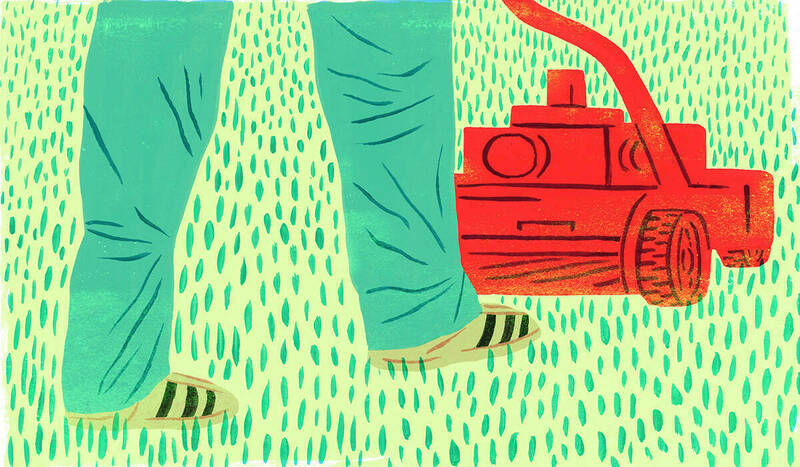 Illustration by Curtis Parker
Illustration by Curtis Parker
Say to me “lawn mowing in summertime” at the wrong moment, and the whirring blades of my mind may alight on an early, boyhood effort to shape the lush, concave quarter-acre around our suburban Virginia home.
Cutting the grass was a dreaded job my older brother was eager to share. It guaranteed two hours of heat and sweat and gnats, a slow fight to keep our steely, no-frills, red Jacobsen rolling straight along the rounded slope that connected sideyard to back. Pushing forward while gravity and the weight of the mower pulled me down toward the bottom of the grassy bowl made the neat lines my father expected an all but impossible dream.
My turn as Sisyphus complete, or so I thought, I trailed Dad through the yard as he pointed — prosecutor strutting about the courtroom — at each tufty ribbon I’d missed, exhibits A through double-Z of my alleged laziness and indifference. “What’s this?” he accused, tacking on another minute to my sentence with each thrust of his finger. “What’s this?”
So how is it that a chore I first did over 30 years ago, an obligation I then hated with the power of the lawn mower explosions I fantasized about, is one I now only reluctantly share with my own children? Say “lawn mowing in summertime” at the right moment, and what surfaces is a fulfilment I find in few other tasks, even though the tree-gnarled city lot I keep trim these days makes the yard of my youth look like a flat college quadrangle.
The pleasures are greatest in spring and fall. And they have little to do with air temperature, or some absurd, imaginary bond with the agrarian toil of my chicken-thieving Hungarian ancestors, or even the sweet, warm, soporific scent of fresh-cut grass. What I really like is the length and thickness of the ryes and blues and fescues of my here-sunny, there-shady, unexpertly maintained lawn. Turn the corner on a row, set the wheels and look back along the boundary hewn between the wilds and civilization, between the unruly thicket that yet needs taming and the orderly green now planed. Accomplishment. Progress.
Stick with me, that before-and-after snapshot of work performed and work yet-to-do says, and you’ll soon feel anew the contentment of a mission complete.
And “complete” is the word for it. Mowing is not editing or the other 9-to-5 responsibilities of my workweek. Lines of type and lines of grass are unalike in that way. Words and phrases are matter for constant negotiation. It’s rare for a writer on his own to find contentment. Bring in an editor, and the deliberations only grow. There’s no finishing. There are only concessions, gracious or ambivalent, and deadlines. The magazine is put to bed? Long live the magazine.
I might feel the same way about shoveling snow as I do about cutting grass, but dry pavement is an elusive goal, and the effort hurts my back. In autumn, the leaves fall even as I clear them, gratification delayed even after the city truck sucks up the last matted clump from the curb. I can always find one more crackly, brown oak or maple rebel still dangling, braced to drop and die, no matter how late I stow the rakes for winter.
Yes, grass grows even as the spinning blade slices through it, once, twice, snicker-snack. But it grows at a kindly, forgiving — I’ll even say human — pace. It carries on patiently, invisibly, in units best measured in weeks. You finish one Saturday afternoon, park the mower in the shed, and abandon all thought of grass as anything more than a place to have a catch or contemplate Whitman or sense Earth with your toes for 167 happy hours until the following Saturday morning.
My wife’s work in her flowerbeds and four-season landscape vignettes is never done. Not really. One day, maybe, I’ll overturn more of my grass and plant rows of tomatoes and cucumbers and beans and whatnot, and draw like her a little nearer to the soil. Until then, I grow and cut grass. I overseed, I feed, I dig up weeds, I nurture it year by year toward greenness and health. Once a week I give it a shave. Alicia does everything else except the tedious filling of yard waste bins — that, too, is my responsibility — but then she’s the artist with the palette, and she creates remarkable beauty. Really: Strangers will stop and remark about it.
I am a mere mower. If she’s the master of the workshop, I’m the apprentice who fashions the rude frames.
I’ve no problem with that. Because what I love about lawn mowing, now that I’ve learned to do it right in one pass, is just that which professional work or rides to soccer practice or dishwashing or trash-collecting or doing my taxes can never give me, and that’s the joy of a simple charge with a beginning, middle and end, and the commonplace satisfaction of a job well done.
John Nagy is managing editor of this magazine.